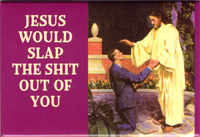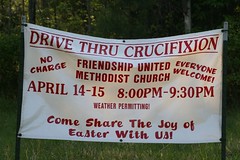I caught this morning’s This I believe essay by Episcopal priest Richard Rohr. In his essay, Rev. Rohr explains that his “religious belief has made [him] comfortable with ambiguity.” He continues:
Whenever I think there’s a perfect pattern, further reading and study reveal an exception. Whenever I want to say “only” or “always,” someone or something proves me wrong. My scientist friends have come up with things like “principles of uncertainty” and dark holes. They’re willing to live inside imagined hypotheses and theories. But many religious folks insist on answers that are always true. We love closure, resolution and clarity, while thinking that we are people of “faith”! How strange that the very word “faith” has come to mean its exact opposite.
I read that as a more eloquent statement of what I always say: for me, faith is about the journey, not the destination.
Ironically, at the end of the essay, Rev. Rohr makes an absolute statement:
People who have really met the Holy are always humble. It’s the people who don’t know who usually pretend that they do. People who’ve had any genuine spiritual experience always know they don’t know. They are utterly humbled before mystery. They are in awe before the abyss of it all, in wonder at eternity and depth, and a Love, which is incomprehensible to the mind. It is a litmus test for authentic God experience, and is — quite sadly — absent from much of our religious conversation today. My belief and comfort is in the depths of Mystery, which should be the very task of religion.
So, according to Re. Rohr, if you think it’s about the destination, not the journey, then you just haven’t had a ‘genuine spiritual experience.” This is where my belief differs from that of Rev. Rohr. I’ve thought long and hard about how a belief in God can mean such diametrically opposed things to different people. My conclusion is that there must be some reason that I can’t comprehend. For me, that remains a mystery.
 This fridge magnet, and several other equally awesome ones, apparently adorn Rick Diamond’s refrigerator (photos taken by Gordon Atkinson). Seeing the magnets and visiting his church‘s web site, I dropped by his office and had a nice chat with him. I’m really intrigued by the approach to their faith that Rick and his fellow ‘journeyers’ take, and I plan to visit their worship service soon.
This fridge magnet, and several other equally awesome ones, apparently adorn Rick Diamond’s refrigerator (photos taken by Gordon Atkinson). Seeing the magnets and visiting his church‘s web site, I dropped by his office and had a nice chat with him. I’m really intrigued by the approach to their faith that Rick and his fellow ‘journeyers’ take, and I plan to visit their worship service soon.


